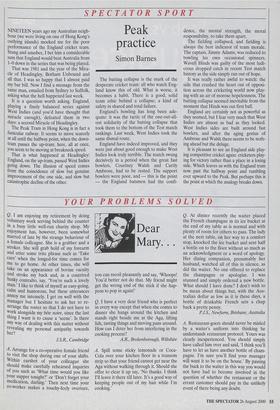SPECTATOR SPORT
Peak practice
Simon Barnes NINETEEN years ago my Australian neigh- bour (we were living on one of Hong Kong's outlying islands) mocked me for the poor performance of the England cricket team. Stung and unsober, I bet him a considerable sum that England would beat Australia from 1-0 down in the series that was being played.
That was 1981 and the year of the Mira- cle of Headingley, Botham Unbound and all that. I was so happy that I almost paid my bar bill. Now I find a message from the same man, emailed from Sydney to Suffolk, asking what the hell happened last week.
It is a question worth asking. England, playing a finely balanced series against West Indies (and you'd have thought that miracle enough), defeated them in two days: a second Miracle of Headingley.
The Peak Tram in Hong Kong is in fact a funicular railway. It seems to move scarcely at all until the halfway point, when the down- tram passes the up-tram; here, all at once, you seem to be moving at breakneck speed.
That is what happened at Headingley: England, on the up-tram, passed West Indies going down. The illusion of speed comes from the coincidence of slow but genuine improvement of the one side, and slow but catastrophic decline of the other. The batting collapse is the mark of the desperate cricket team: all who watch Eng- land know this of old. What is worse, it becomes a habit. There is a good, solid team ethic behind a collapse; a kind of safety in shared and total failure.
England's bowling has long been ade- quate: it was the tactic of the one-out-all- out solidarity of the batting collapse that took them to the bottom of the Test match rankings. Last week, West Indies took the same dismal route.
England have indeed improved, and they were just about good enough to make West Indies look truly terrible. The match swung decisively in a period when the great fast bowlers, Courtney Walsh and Curtly Ambrose, had to be rested. The support bowlers were poor, and — this is the point — the England batsmen had the confi- dence, the mental strength, the moral responsibility, to take them apart.
The fielding collapsed, and fielding is always the best indicator of team morale. The captain, Jimmy Adams, was reduced to bowling his own occasional spinners. Wavell Hinds was guilty of the most ludi- crous dropped catch in recent Test match history as the side simply ran out of hope.
It was really rather awful to watch: the side that crushed the heart out of opposi- tion across the cricketing world now play- ing with an air of morose hopelessness. The batting collapse seemed inevitable from the moment that Hinds was out first ball.
England are certainly not as powerful as they seemed, but I fear very much that West Indies are almost as bad as they looked. West Indies sides are built around fast bowlers, and after the aging genius of Ambrose and Walsh there seems to be noth- ing ahead but the deluge.
It is pleasant to see an England side play- ing competitive cricket again: cricketers play- ing for victory rather than a place in a losing side. Which leaves us with the England tram now past the halfway point and rumbling ever upward to the Peak. But perhaps this is the point at which the analogy breaks down.


























































 Previous page
Previous page